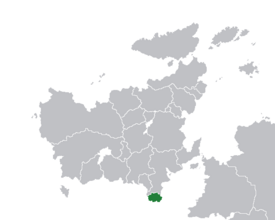Austeria
Republic of Austeria Republika e Gallenisë
Other names
| |||||||
|---|---|---|---|---|---|---|---|
| Motto: "Trimëri, vëllazëri dhe liri" (Tethian) | |||||||
| Anthem: Liberty "Liri" | |||||||
 | |||||||
| Capital and city | |||||||
| Official languages | Tethian | ||||||
| Recognised national languages | |||||||
| Ethnic groups (2020) |
| ||||||
| Religion (2020) |
| ||||||
| Demonym(s) | Austerian | ||||||
| Government | Unitary semi-presidential republic | ||||||
| Nertilian Bushaj | |||||||
• Premier | Hershor Dreshaj | ||||||
| Xhuàn Patrè | |||||||
| Legislature | Senate | ||||||
| History of Austeria | |||||||
• End of Arciluco rule | 7th century | ||||||
• Apolitan Kingdom | 1431 | ||||||
• Annexation into Etruria | 1789 | ||||||
| 1801 | |||||||
• Reannexation into Etruria | 1854 | ||||||
• Independence from Etruria | 1946 | ||||||
• First republic | 1947 | ||||||
• Second republic | 1993 | ||||||
| Area | |||||||
• | 62,532 km2 (24,144 sq mi) | ||||||
| Population | |||||||
• 2020 estimate | 12,270,164 | ||||||
• Density | 182.75/km2 (473.3/sq mi) | ||||||
| GDP (PPP) | 2020 estimate | ||||||
• Total | $226 billion | ||||||
• Per capita | $19,767 | ||||||
| GDP (nominal) | 2020 estimate | ||||||
• Total | $193 billion | ||||||
• Per capita | $16,938 | ||||||
| Gini (2020) | 42.4 medium | ||||||
| HDI (2020) | 0.850 very high | ||||||
| Currency | Austerian Flori (TRF (ƒ)) | ||||||
| Date format | dd/mm/yyyy | ||||||
| Driving side | right | ||||||
| Calling code | +101 | ||||||
| ISO 3166 code | AUS | ||||||
| Internet TLD | .au | ||||||
Austeria, officially the Republic of Austeria (Tethian: Republika e Gallenisë), also known as Galenia, is a sovereign state located in southern Euclea bordered by Etruria to the north and surrounded by the Acheloian Sea to the south and west and the Solarian Sea to the east. Austeria has a population of 12 million people. The capital and most populous city is Kartha.
Historically, Austeria has been controlled by different civilisations over time, mainly the Piraeans, Solarians, Amathians, and the Etrurians. The first recorded settlements in Austeria was originally inhabited by the Gadishullorian tribes, but the first walled settlement was founded by Piraeans in the 5th century BCE, which would become the city of Kartha. In the 2nd century BCE, Irfan arrived by oceanic trade networks from Coius beginning its long influence in the region. Local states would be in regular conflict with Pirean city-states until it was conquered by the Solarian Empire in the 2nd century BCE. Under the Solarian Empire and its successor the Empire of Arciluco, the peninsula was a major center for trade from Coius. The Marolevic migration in the 6th century and the Tethian conversion to Irfan marked the end of direct rule by the Arciluco Empire which was replaced by many Tethian and Montsurian principalities. During the Iconoclast Wars, the Principality of Senturèn took over the peninsula and established the Apolitan Kingdom. The Apolitan Empire clashed with Povelia until they were both were annexed by the Etrurian First Republic during the Etrurian Revolution. Montsuria briefly gained independence as a revolutionary republic in 1801 before it was reannexed by the restored monarchy of Etruria in 1855. However this brief period of independence sparked a national awakening known as the Austerian Renaissance, beginning a period of cooperation between the Tethians and Montsurians. After the rise of the functionalist Greater Solarian Republic, Irfanic communities across to the region were subject to a genocide of forced deportations to concentration camps in Austeria. Following the end of the Solarian War, the modern state of Austeria declared independence in 1946. The new Austerian state was relatively stable until the large-scale outbreak of social turmoil, political violence and upheaval from the early 1970s to the late 1990s marked by a wave of ethnic and religious terrorism and violent clashes. Since the war ethnic and religious tensions have remained high despite significant economic growth and the return of political stability.
As of the 1956 constitution, Austeria is a unitary semi-presidential constitutional republic with a president elected every four years as head of state. Legislative power is vested in the unicameral Senate, led by a Premier, appointed by the President, who serves as as head of government. The country's political history since independence been characterized by periods of significant economic growth as well as those of political instability and ethnic strife. The country continues to face challenges such as corruption, poor diplomatic relations with Etruria and Zorasan, lingering ethnic tensions, and refugee crises. The Austerian economy is heavily based in the service sector, international trade, and tourism. Austeria is considered one of the most visited countries in Euclea and the world due to its lush beaches and summer resorts. Other major sectors of the economy is agriculture, especially wine production, and beer brewing. The government has a considerable control on the country's economy, holding shares in key-sectors of the economy. Austeria is an active member of the Community of Nations, International Council for Democracy and the International Trade Organisation. The country is currently in the process of joining the Euclean Community.

